U.S. consumer sentiment shows slight improvement
Visit our interactive portal, Ipsos Consolidated Economic Indicators (IpsosGlobalIndicators.com) for graphic comparisons and trended data pertaining to the Ipsos Global Consumer Confidence Index and sub-indices -- and all the questions on which they are based.
Washington, DC, October 29, 2020 — After holding steady for two consecutive weeks, the Ipsos-Forbes Advisor U.S. Consumer Confidence Index is up 1.1 points to 52.6.
The greatest gains over last week are to be seen in the Jobs sub-index, which rose 2.2 points to 56.8. The survey finds a small drop in the percentage of Americans thinking they or people they know could lose their job in the next six months.
This muted improvement in job-related sentiment is reflected in the slowdown in new unemployment claims filed last week. At 751,000, new unemployment claims fell to the lowest point seen in seven months.
However, heading into the November 3rd election, six in ten Americans feel less comfortable making a major purchase like a home or a car than they were six months ago.
Under a new partnership announced today, Forbes Advisor will have exclusive advance access to Ipsos U.S. Consumer Confidence weekly data, allowing its readers to have up-to-date insights to make informed financial choices. Read Forbes Advisor’s article on this week’s results of the Ipsos-Forbes Advisor U.S. Consumer Confidence Weekly Tracker.
Detailed Findings
1. Scoring at 52.6, the overall U.S. Consumer Confidence Index is up 1.1 points from last week. It is 3.3 points above the pandemic average, but 7.5 points lower than where it stood in early March (60.1).

2. The Expectations sub-index also shows an increase of just over one point (1.3) from last week to 65.3.
3. The Current and Investment sub-indices are statistically unchanged at 43.6 and 46.7 respectively, having risen by just 0.3 points each.
4. Jobs confidence shows the greatest gains this week, rising 2.2 points, as Americans indicate some improvement in employment-related sentiment. New unemployment claims fell to 751,000, the lowest level in seven months.
- This week, 42% report they, a family member, or a personal acquaintance lost their job in the past six months due to economic conditions, down 3 points from last week.
- In addition, 46% say it’s likely they, a family member, or a personal acquaintance will lose their job in the next six months due to economic conditions, down 4 points from last week.
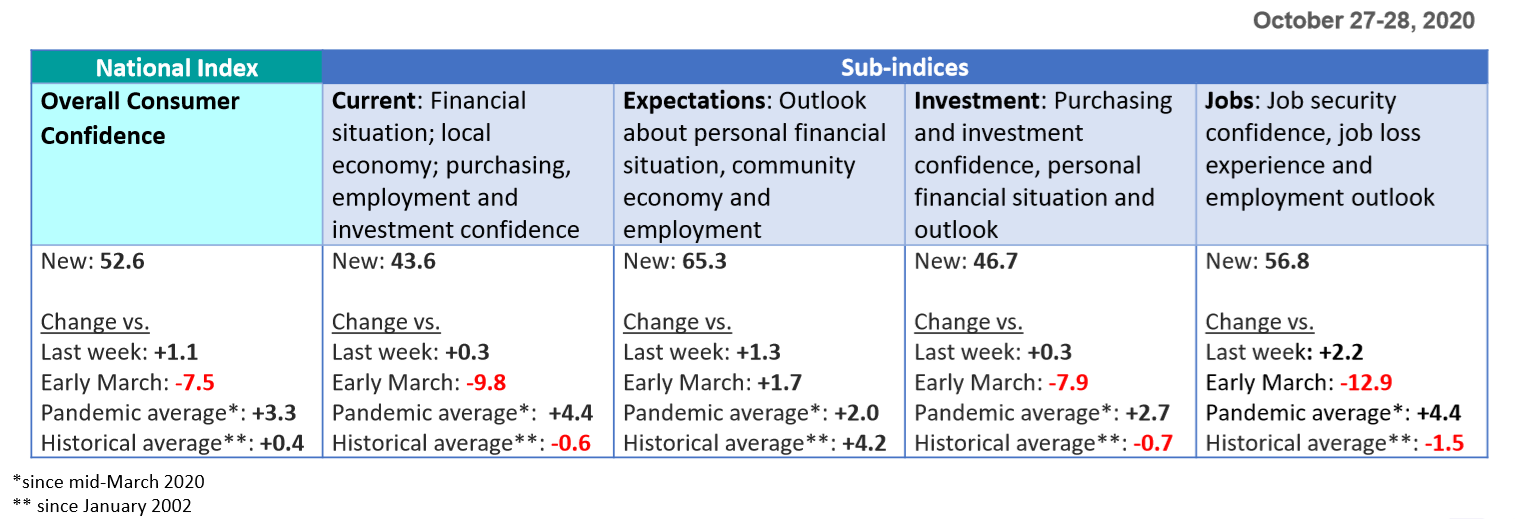
5. Consistent with last week, a majority of Americans (51%) foresee a quick economic recovery once pandemic restrictions are lifted on businesses. Disagreement with this assessment is up 3 points from last week to 43%.
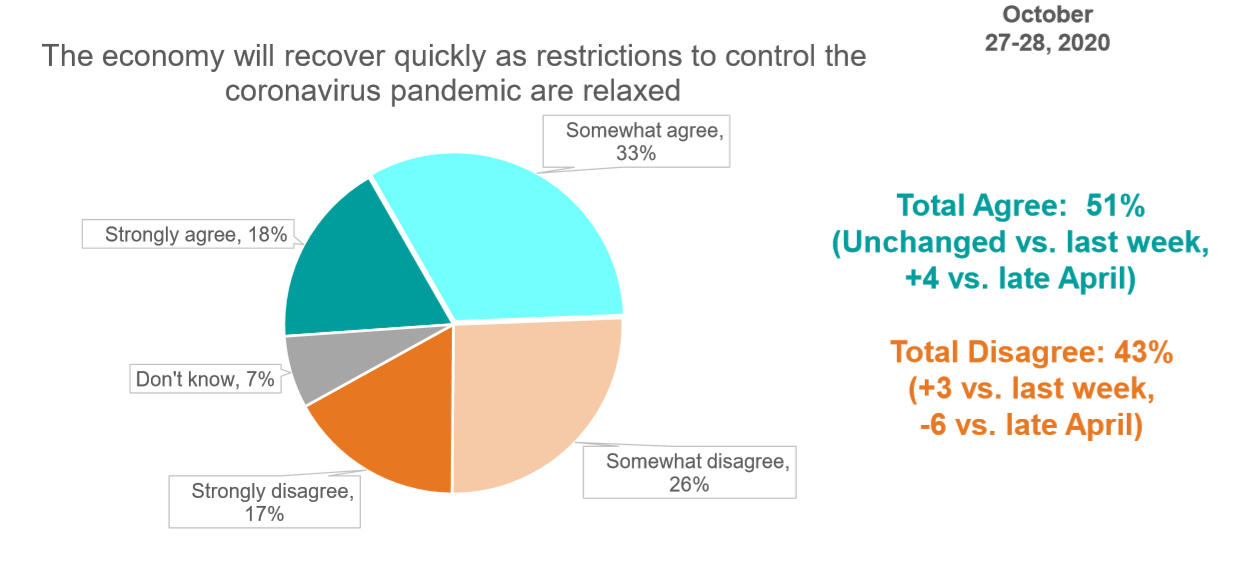
6. The nation is divided on restarting the economy if the coronavirus is not fully contained yet: 48% agree that businesses should be allowed to open up again, 47% disagree.
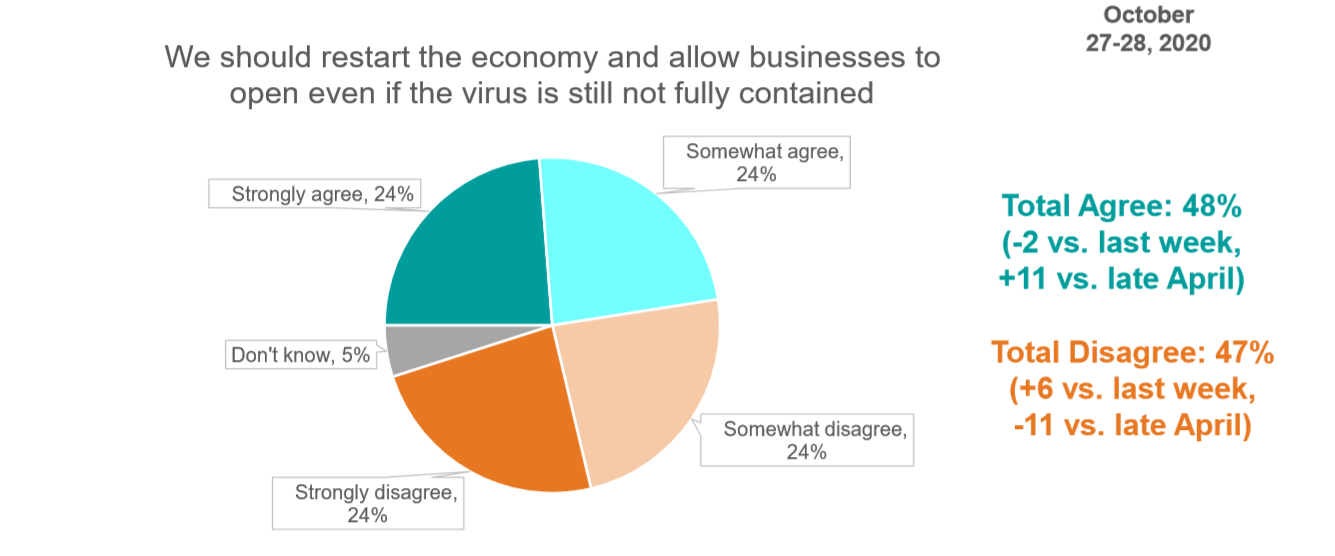
7. A majority of Americans remain uncomfortable engaging both in major purchases, such as a home or a car, and in other household purchases.
- Compared to six months ago, 61% say they are less comfortable making a major purchase like a home or a car, down 1 point from last week.
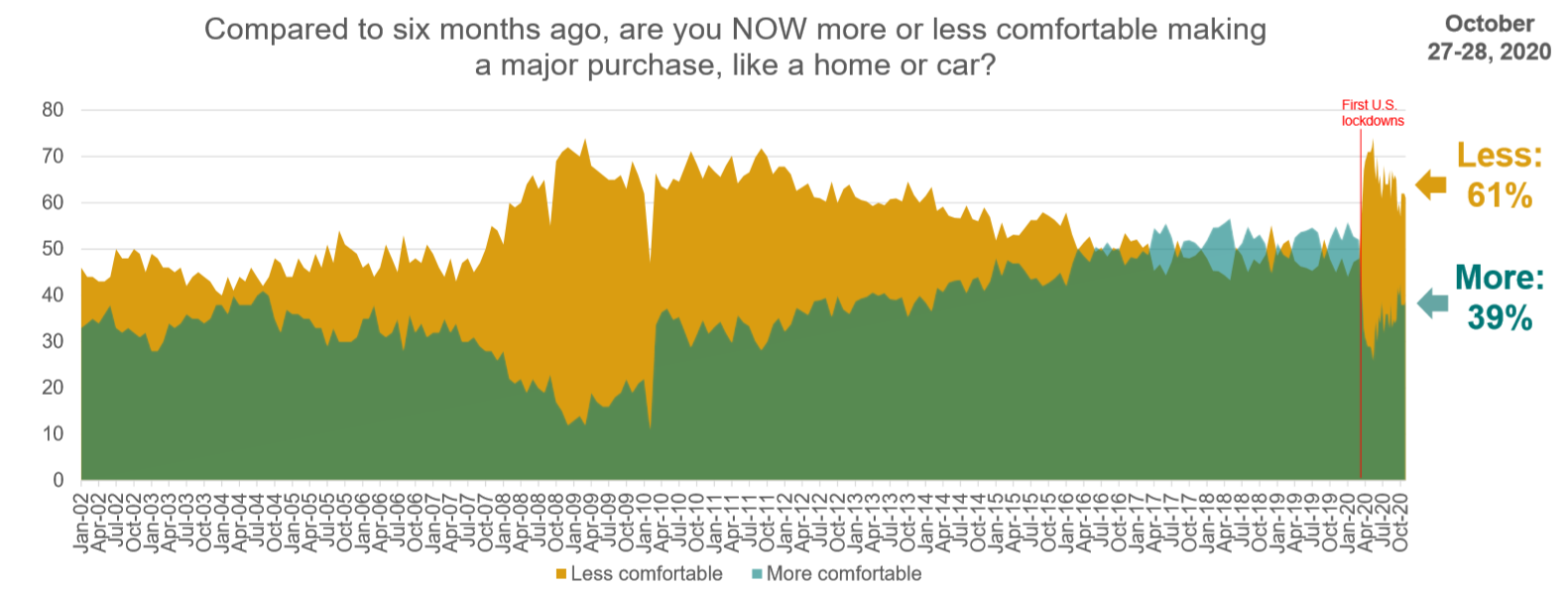
-
Compared to six months ago, 57% say they are less comfortable making other household purchases, up 1 point from last week.
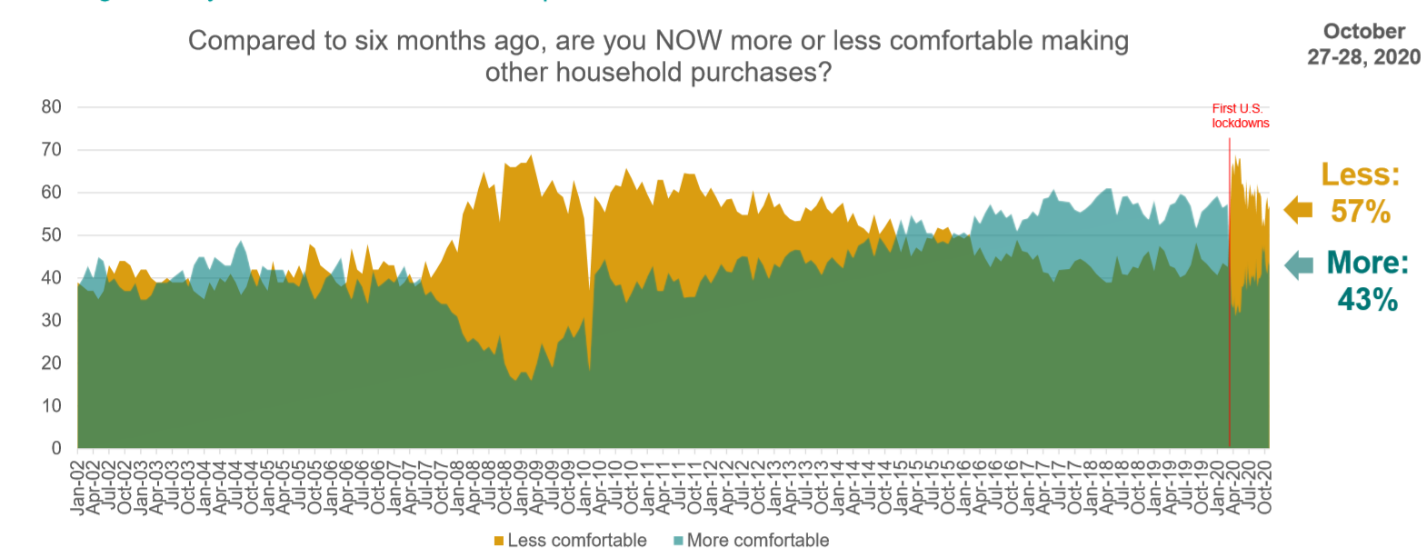
Questions
The data used for the Consumer Confidence index and sub-indices is based on the following questions:
- Now, thinking about our economic situation, how would you describe the current economic situation in US? Is it… very good, somewhat good, somewhat bad or very bad?
- Rate the current state of the economy in your local area using a scale from 1 to 7, where 7 means a very strong economy today and 1 means a very weak economy.
- Looking ahead six months from now, do you expect the economy in your local area to be much stronger, somewhat stronger, about the same, somewhat weaker, or much weaker than it is now?
- Rate your current financial situation, using a scale from 1 to 7, where 7 means your personal financial situation is very strong today and 1 means it is very weak
- Looking ahead six months from now, do you expect your personal financial situation to be much stronger, somewhat stronger, about the same, somewhat weaker, or much weaker than it is now?
- Compared to 6 months ago, are you NOW more or less comfortable making a major purchase, like a home or car?
- Compared to 6 months ago, are you NOW more or less comfortable making other household purchases?
- Compared to 6 months ago, are you NOW more or less confident about job security for yourself, your family and other people you know personally?
- Compared to 6 months ago, are you NOW more or less confident of your ability to invest in the future, including your ability to save money for your retirement or your children’s education?
- Thinking of the last 6 months, have you, someone in your family or someone else you know personally lost their job as a result of economic conditions?
- Now look ahead at the next six months. How likely is it that you, someone in your family or someone else you know personally will lose their job in the next six months as a result of economic conditions?
Additional questions
Q. To what extent do you agree with the each of the following
- The economy will recover quickly once the restrictions to control the coronavirus pandemic are relaxed.
- We should restart the economy and allow businesses to open even if the virus is still not fully contained.
About the Study
These findings are based on data from an Ipsos survey conducted October 27-28, 2020 with a sample of 927 adults aged 18-74 from the continental U.S., Alaska and Hawaii who were interviewed online in English.
The sample was randomly drawn from Ipsos’ online panel, partner online panel sources, and “river” sampling and does not rely on a population frame in the traditional sense. Ipsos uses fixed sample targets, unique to each study, in drawing a sample. After a sample has been obtained from the Ipsos panel, Ipsos calibrates respondent characteristics to be representative of the U.S. Population using standard procedures such as raking-ratio adjustments. The source of these population targets is U.S. Census 2016 American Community Survey data. The sample drawn for this study reflects fixed sample targets on demographics. Post-hoc weights were made to the population characteristics on gender, age, race/ethnicity, region, and education.
Statistical margins of error are not applicable to online non-probability polls. All sample surveys and polls may be subject to other sources of error, including, but not limited to coverage error and measurement error. Where figures do not sum to 100, this is due to the effects of rounding. The precision of Ipsos online polls is measured using a credibility interval. In this case, the poll has a credibility interval of plus or minus 3.7 percentage points for all respondents. Ipsos calculates a design effect (DEFF) for each study based on the variation of the weights, following the formula of Kish (1965). This study had a credibility interval adjusted for design effect of the following (n=927, DEFF=1.5, adjusted Confidence Interval=+/-5.2 percentage points).
Findings from previous time periods going back to March 2011 are based on data from Refinitiv /Ipsos’ Primary Consumer Sentiment Index (PCSI) collected in a monthly survey on Ipsos’ Global Advisor online survey platform with the same questions. For the PCSI survey, Ipsos interviews a total of 1,000+ U.S. adults aged 18-74. The Refinitiv/Ipsos Primary Consumer Sentiment Index (PCSI), ongoing since 2010, is a monthly survey of consumer attitudes on the current and future state of local economies, personal finance situations, savings and confidence to make large investments. The PCSI metrics reported each month consist of a “Primary Index” based on 10 questions available upon request and of several “sub-indices” each based on a subset of these 10 questions. Those sub-indices include a Current Index, an Expectations Index, an Investment Index and a Jobs Index.
Findings for January 2002- February 2011 are based on data from the RBC CASH Index, a monthly telephone survey of 1,000 U.S. adults aged 18 and older conducted by Ipsos with a margin of error of +/- 3.1 percentage points.
For more information on this news release, please contact:
Chris Jackson
Senior Vice President, U.S., Public Affairs
Ipsos
+1 202 420 2025
[email protected]
Kate Silverstein
Media Relations Specialist, U.S., Public Affairs
Ipsos
+1 718 755-8829
[email protected]
For more information on COVID-19 please click here
About Ipsos
Ipsos is the world’s third largest market research company, present in 90 markets and employing more than 18,000 people.
Our passionately curious research professionals, analysts and scientists have built unique multi-specialist capabilities that provide true understanding and powerful insights into the actions, opinions and motivations of citizens, consumers, patients, customers or employees. We serve more than 5000 clients across the world with 75 business solutions.
Founded in France in 1975, Ipsos is listed on the Euronext Paris since July 1st, 1999. The company is part of the SBF 120 and the Mid-60 index and is eligible for the Deferred Settlement Service (SRD).
ISIN code FR0000073298, Reuters ISOS.PA, Bloomberg IPS:FP www.ipsos.com



